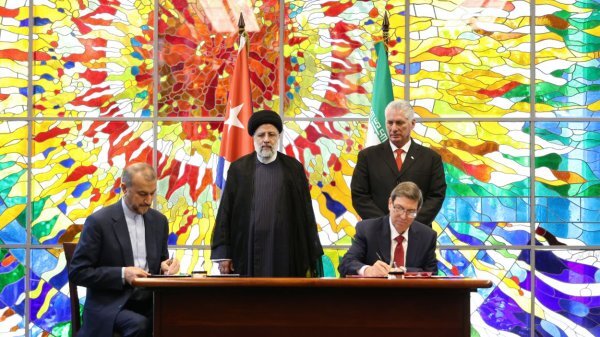Tehran, Havana ink 6 co-op pacts
Tehran, Havana ink 6 co-op pacts
Senior officials of Iran and Cuba signed six cooperation documents in the presence of the presidents of the two countries on Thursday.

As reported, the documents cover a variety of areas including jurisdiction, comprehensive political cooperation, customs, and cooperation in the field of information technology.
During his official visit to Cuba, President Ebrahim Raisi attended a joint meeting of the high-ranking delegations of the two countries and proposed forming a joint committee on technological cooperation between the two countries.
Speaking in this meeting, Raisi pointed out that relations between Iran and Cuba have changed since the victory of the Islamic Revolution, saying, "In the years since the victory of the Islamic Revolution, the relations between the two countries have always been developing, and especially in recent years and during the coronavirus pandemic, constructive cooperation has taken place".
Stating that Iran and Cuba have important common grounds for expanding mutual cooperation, he said, "Iran is ready to cooperate with all countries, but if a country acts against the interests of our nation, we will stand against it".
In this meeting, Cuban President Miguel Diaz-Canel welcomed President Raisi to the country and said, "Your visit to Cuba is meaningful and the proof of the existence of a set of common values and views between the two countries".
In late May, the secretary General of the Tehran Chamber of Commerce, Industries, Mines and Agriculture (TCCIMA), in a meeting with Antonio Luis Carricarte Corona, president of the Chamber of Commerce of the Republic of Cuba (CC), and the country’s Ambassador to Tehran Alberto Gonzalez Casals, has offered a trilateral economic cooperation model for expanding ties with Cuba and Venezuela.
As reported by the TCCIMA portal, at the meeting Bahman Eshghi referred to the economic relations formed between Iran and Venezuela in recent years, and called for the creation of a trilateral market between Iran, Venezuela, and Cuba in order to form the foundation for the exchange and transfer of goods and financial transfers among the three sides.
Eshghi stated that the forward and continuous process of economic relations between the two countries of Iran and Cuba can be developed with the exchange of goods with third countries.
Also, in mid-May, Antonio Luis Carricarte Corona, president of the Chamber of Commerce of the Republic of Cuba (CC) along with the country’s Ambassador to Tehran Alberto Gonzalez Casals held a meeting with Deputy Head of Iran Chamber of Commerce, Industries, Mines and Agriculture (ICCIMA) Hossein Selahvarzi, to discuss ways of expanding cooperation between the private sectors of the two countries.
In the meeting which was held at the place of the ICCIMA, the two sides discussed potential areas for joint cooperation with the aim of increasing the level of trade exchanges between the two countries, the ICCIMA portal reported.
Speaking at the meeting, Corona called on the governments of the two countries to provide the conditions for the joint commercial activities of the private sectors and the chambers of commerce of the two countries.
“In this context, we can establish a link between the private and public sectors and define joint projects to increase the level of cooperation so that Iranian and Cuban companies can be in continuous communication,” he stated.
Mentioning the common fields of cooperation between Iran and Cuba, the official said: “Priorities and needs of the two countries should be determined; For example, Iran has good conditions in the field of agriculture and production of agricultural products. Or Cuba has a very high capacity in the field of tourism, which should be paid attention to.”
He further noted that his government is willing to make the necessary arrangements for the opening of an Iranian trade center in Cuba with the aim of facilitating trade between the two sides.
Corona also stressed the need for joint collaboration with third countries and said: “We can jointly produce products and export them to countries in the region. In this regard, we can invest in products that have a quick return on investment.”
Selahvarzi for his part welcomed the ideas presented by the Cuban side and said: “There is considerable capacity for economic and commercial cooperation between the two countries, although in this direction, the geographical distance and the economic sanctions on the two countries are two serious obstacles.”
He called for more cooperation between Iran and Cuba in the fields of food, pharmaceuticals, mines, nanotechnology and tourism.

Write your comment.